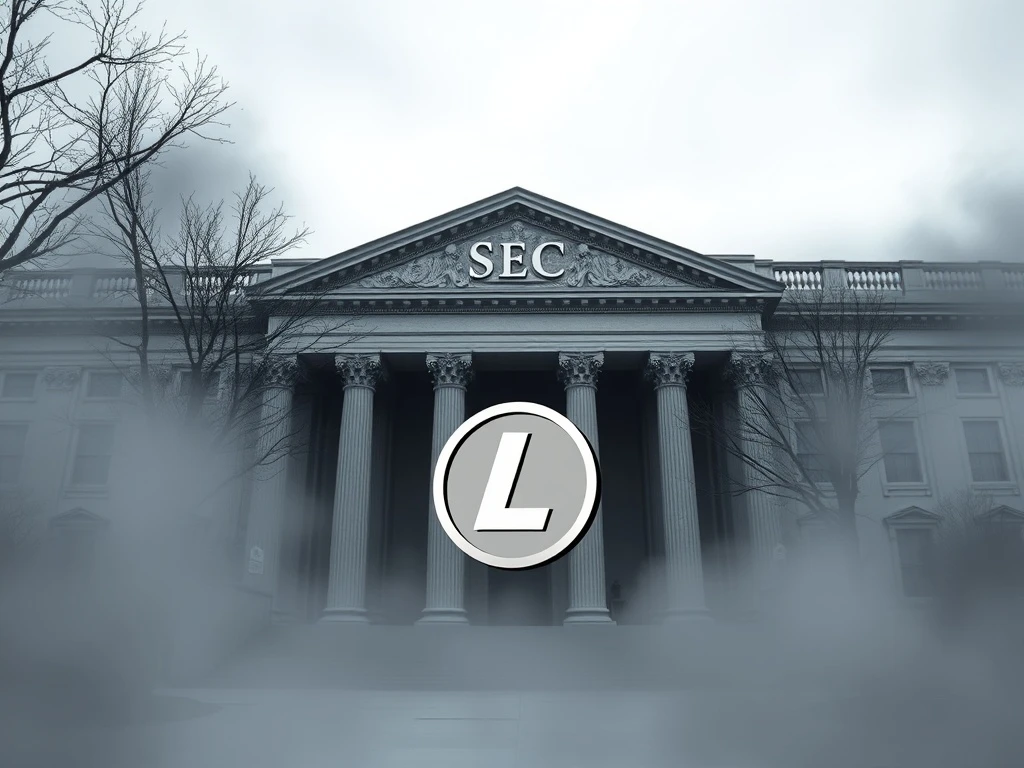Litecoin ETF Faces Uncertain Future Amidst SEC Silence and Government Shutdown

The cryptocurrency community watches closely. A significant development unfolded recently. The US Securities and Exchange Commission (SEC) has remained silent on the **Canary Litecoin ETF**. This silence occurred on its decision deadline. It adds considerable uncertainty to the market. Furthermore, a federal **government shutdown** compounds these issues. New generic listing standards also play a role. Investors and analysts are now questioning the path forward for **crypto ETF approval** and other **digital asset products**.
Litecoin ETF Approval: Awaiting SEC’s Crucial Decision
Canary Capital’s spot **Litecoin ETF** remains in limbo. The SEC took no action on Thursday. This was the original deadline for a decision. Consequently, the crypto community faces deep uncertainty. They ponder how the regulator will function. This includes operations during a federal **government shutdown**. Also, the impact of new generic listing standards is unclear. These standards could affect timelines for dozens of **crypto ETF approval** applications. These applications await regulatory consent.
Bloomberg ETF analyst James Seyffart observed the situation. FOX News reporter Eleanor Terrett also noted key changes. They suggest old 19b-4 deadlines for crypto ETF applications may no longer apply. The SEC has requested applicants withdraw these documents. Therefore, the S-1 registration statement becomes the sole document. It now requires regulatory approval. This shift marks a significant procedural change.
Government Shutdown’s Shadow Over Crypto ETF Approval
A deeper layer of uncertainty surrounds the **government shutdown**. The SEC had an “Operation Plan” for such an event. They posted it in August. This plan stated the commission would “not review and approve applications for registration.” This directive impacts various areas. It includes new financial products. Self-regulatory organization rule changes are also affected. Furthermore, reviewing or accelerating registration statements falls under this limitation. The SEC’s silence on Canary’s spot **Litecoin ETF** is therefore multifaceted. It could stem from the shutdown. Alternatively, new generic listing standards might be the cause. These standards could render the 19b-4 deadline irrelevant.
Canary further complicated matters. They withdrew their 19b-4 application. This occurred on September 25. The SEC requested this withdrawal. This action likely contributed to the SEC’s non-decision. The impact on applicants who have not withdrawn this document remains unclear. The official Litecoin account shared this development:

Crypto News Insights sought comments. They reached out to both the SEC and Canary. However, no immediate response was received. Despite the **government shutdown**, the SEC confirmed it would operate. This operation would be with a “very limited” number of staff. The Electronic Data Gathering, Analysis and Retrieval (EDGAR) database would remain operational.
Navigating New Generic Listing Standards for Digital Asset Products
The market anticipates potential approval for several new spot crypto ETFs. This includes Litecoin (LTC) and Solana (SOL). XRP (XRP), Avalanche (AVAX), Cardano (ADA), Chainlink (LINK), and Dogecoin (DOGE) are also contenders. Any approval would expand the US spot crypto ETF market. Currently, this market includes Bitcoin (BTC) and Ether (ETH) ETFs. These have attracted significant inflows. Bitcoin ETFs brought in $61.3 billion. Ether ETFs secured $13.4 billion since their launch. These figures highlight strong investor interest in **digital asset products**.
Despite current setbacks, optimism persists. Bloomberg ETF analyst Eric Balchunas offered a positive outlook. He stated on Monday that the SEC’s new listing standards are beneficial. He bumped the odds of some spot **crypto ETF approval** to 100%. These listing standards aim to streamline the process. They fall under Rule 6c-11. This change could significantly reduce approval timelines. These timelines typically extend up to 240 days. SEC Chair Paul Atkins supports these changes. He said the new listing standards will reduce barriers. This provides easier access to **digital asset products**. It also offers investors more choices.
The Future of Crypto ETF Approval and Digital Asset Products
The convergence of the **government shutdown**, the SEC’s silence, and evolving listing standards creates a complex environment. However, the underlying demand for diversified **digital asset products** remains strong. The potential for a wider range of spot crypto ETFs, including a **Litecoin ETF**, could reshape the investment landscape. As regulatory clarity emerges, the market expects a more efficient approval process. This could unlock substantial new capital for the altcoin sector. The industry continues to push for mainstream adoption and accessible investment vehicles.








